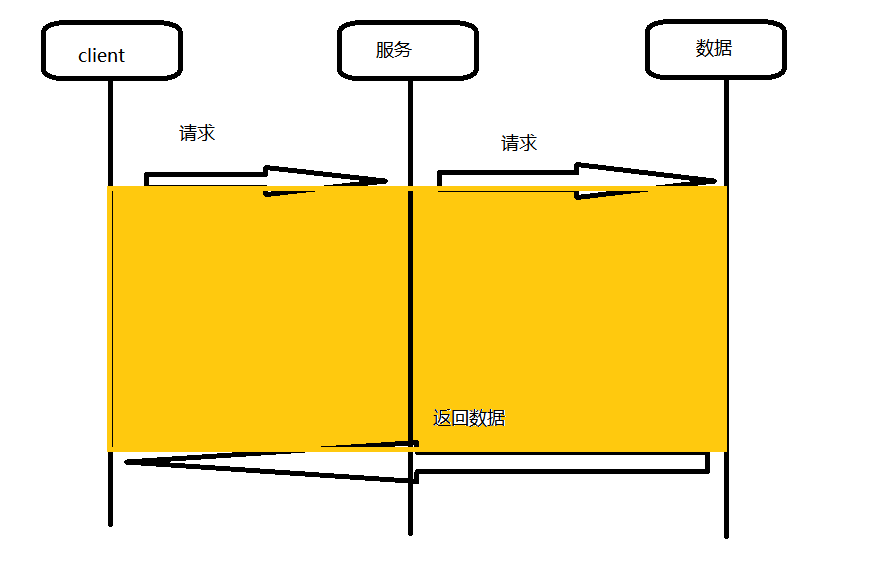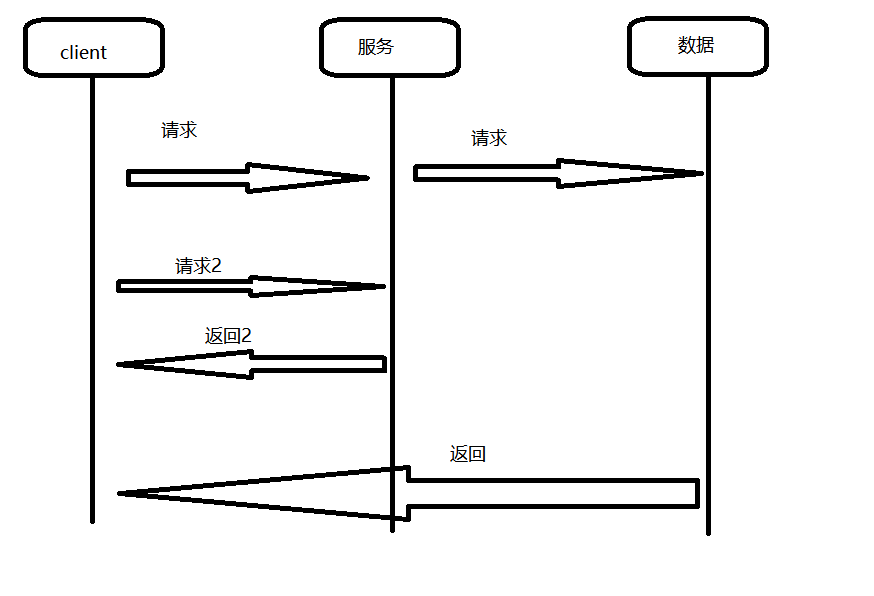话说,不看不知道,都说JDK7当时升级JDK8的时候,升级了非常多的内容,不得不说,这升级真的大。
什么是异步编程
在很多时候,我们在进程中使用单一线程从头到尾地执行程序,比如程序向另外一台服务器发出请求,由于网络等外部原因,此种通信任务往往会耗费大量时间,进程如果在此期间仅仅只能等待网络或网络上其他机器的响应,将严重地降低了性能。
如果程序调用某个方法,等待其执行全部处理后才能继续执行,我们称其为同步的。相反,在处理完成之前就返回调用方法则是异步的。
我们在编程语言的流程中添加了异步控制的部分,这部分的编程可以称之为异步编程。
JDK中的异步编程
Future
Future模式在 JDK5 的时候就有, Future模式,只是发起了耗时操作,函数立马就返回了,真正执行具体操作由另外一个工作线程去完成,并不会阻塞客户端线程。所以在工作线程执行耗时操作的时候客户端无需等待,可以继续做其他事情,等到需要的时候再向工作线程获取结果。
举个最简单的例子,我们烧水的时候么,不用一直在炉子旁边看着,在烧水的过程中,我们需要做一些其他的事情,比如去写一会代码,但是在你去写代码之前,会给你一个假的结果,比如,我已经烧开了,但是,在你去写代码的时候,他就开始疯狂加火,等到水烧开为止,等到你口渴想倒水的时候,发现水是已经烧开的,也就是说,当你在写代码之前的时候收到的是个假的结果。
实际上,Future 模式无法立即给出你想要的结果,但它会给你一个契约,之后你可以随时通过这个契约来获取你想要的结果。
异步模式主要是和同步模式进行对比的,我们画个图来看看。

黄色区域的位置的Y轴长度则表示的是你需要等待的所有时间,在这个时间内,你没有办法做任何的事情,只能在这里等着,但是异步的话,就完全不用这个样子了。

在JDK中Future模式有一套完整的实现。
我们来写案例代码实验一下:
没有是用 Future 的代码。
NormalThreadTest
public class NormalThreadTest {
public static void main(String[] args) throws Exception {
long start = System.currentTimeMillis();
// 开启购买厨具线程
ShoppingThread shopping = new ShoppingThread();
shopping.start();
shopping.join(); // 保障厨具购买并送货
// 获取到购买厨具
KitchenWare kc = shopping.kc;
// 买食材
FoodMaterial fm = new FoodMaterial();
Thread.sleep(2000);
System.out.println("第二步: 食材已经到位");
// 烹饪美食
cooking(kc, fm);
System.out.println("第三步: 美食烹饪完成");
long end = System.currentTimeMillis();
System.out.println("烹饪美食时间为:" + (end - start));
}
/**
* 定义网上购物厨具线程
* @author Administrator
*
*/
static class ShoppingThread extends Thread {
// 厨具对象引用
private KitchenWare kc;
@Override
public void run() {
System.out.println("第一步: 网上下单");
System.out.println("第一步: 等待厨具");
try {
Thread.sleep(5000); // 等待厨具时间
} catch (InterruptedException e) {
e.printStackTrace();
}
System.out.println("第一步: 快递送货");
// 生产厨具
kc = new KitchenWare();
}
}
/**
* 厨具类
* @author Administrator
*
*/
static class KitchenWare {
}
/**
* 食材类
* @author Administrator
*
*/
static class FoodMaterial {
}
/**
* 定义烹饪食物的方法
* @param kc
* @param fm
*/
static void cooking(KitchenWare kc, FoodMaterial fm) {
}
}
运行结果:
第一步: 网上下单
第一步: 等待厨具
第一步: 快递送货
第二步: 食材已经到位
第三步: 美食烹饪完成
烹饪美食时间为:7043
已经使用Future的代码。
FutureThreadTest
public class FutureThreadTest {
public static void main(String[] args) throws Exception {
long start = System.currentTimeMillis();
Callable<KitchenWare> callable = new Callable<KitchenWare>() {
public KitchenWare call() throws Exception {
System.out.println("第一步: 网上下单");
System.out.println("第一步: 等待厨具");
try {
Thread.sleep(5000); // 等待厨具时间
} catch (InterruptedException e) {
e.printStackTrace();
}
System.out.println("第一步: 快递送货");
return new KitchenWare();
}
};
// 包装为异步执行的对象
FutureTask<KitchenWare> task = new FutureTask<>(callable);
new Thread(task).start();
// 买食材
FoodMaterial fm = new FoodMaterial();
Thread.sleep(2000);
System.out.println("第二步: 食材已经到位");
if (!task.isDone()) {
System.out.println("厨具还没有到.....");
}
// 通过阻塞形式获取到异步块执行的结果
KitchenWare kc = task.get(); // 阻塞
// 烹饪美食
cooking(kc, fm);
System.out.println("第三步: 美食烹饪完成");
long end = System.currentTimeMillis();
System.out.println("烹饪美食时间为:" + (end - start));
}
/**
* 厨具类
* @author Administrator
*
*/
static class KitchenWare {
}
/**
* 食材类
* @author Administrator
*
*/
static class FoodMaterial {
}
/**
* 定义烹饪食物的方法
* @param kc
* @param fm
*/
static void cooking(KitchenWare kc, FoodMaterial fm) {
}
}
执行结果:
第一步: 网上下单
第一步: 等待厨具
第二步: 食材已经到位
厨具还没有到.....
第一步: 快递送货
第三步: 美食烹饪完成
烹饪美食时间为:5027
这个是JDK5中就有的 Future 来实现 异步编程的,那么接下来我们看1.8的异步编程。
CompletableFuture
Future 虽然可以实现获取异步执行结果的需求,但是它没有提供通知的机制,我们无法得知Future什么时候完成,我们通过上面的代码也完全能看出来。
为什么在JDK5之后,又推出新的异步编程,因为使用 Future 要么使用阻塞,在 future.get() 的地方等待 Future 返回的结果,这时又变成同步操作。要么使用 isDone() 轮询地判断 Future 是否完成,这样会耗费CPU的资源。所以阿粉猜测所以在JDK8又推出了 CompletableFuture。
之前 Future 需要等待 isDone 为 true 才能知道任务跑完了。或者就是用 get 方法调用的时候会出现阻塞。而使用 CompletableFuture 的使用就可以用 then , when 等等操作来防止以上的阻塞和轮询 isDone 的现象出现。
CompletableFuture 有四个方法来创建CompletableFuture对象。
public static CompletableFuture<Void> runAsync(Runnable runnable)
public static CompletableFuture<Void> runAsync(Runnable runnable, Executor executor)
public static <U> CompletableFuture<U> supplyAsync(Supplier<U> supplier)
public static <U> CompletableFuture<U> supplyAsync(Supplier<U> supplier, Executor executor)
Asynsc表示异步,而supplyAsync与runAsync不同在与前者异步返回一个结果,后者是void.第二个函数第二个参数表示是用我们自己创建的线程池,否则采用默认的ForkJoinPool.commonPool()作为它的线程池.其中Supplier是一个函数式接口,代表是一个生成者的意思,传入0个参数,返回一个结果。
我们写一个最简单的测试代码:
public static void test2() throws Exception {
//supplyAsync内部使用ForkJoinPool线程池执行任务
CompletableFuture<String> completableFuture=CompletableFuture.supplyAsync(()->{
//模拟执行耗时任务
System.out.println("task doing...");
try {
Thread.sleep(3000);
} catch (InterruptedException e) {
e.printStackTrace();
}
//返回结果
return "100";
}).whenComplete((v,r)->{
System.out.println("计算结果是: "+v);
});
//CompletableFuture里使用的线程池里的线程默认是daemon的。main线程结束后,整个程序也
//结束了,这里将main线程join后任务里的代码才可以执行完
Thread.currentThread().join();
}
而使用 CompletableFuture 能有效的避开使用 Futrue 出现的缺点。
看来,JDK 每一次的更新换代,不光是加了一些新的内容,而且像开发一样,每次迭代的时候,同时也会更新之前的一些不完美的内容,不是么?


































